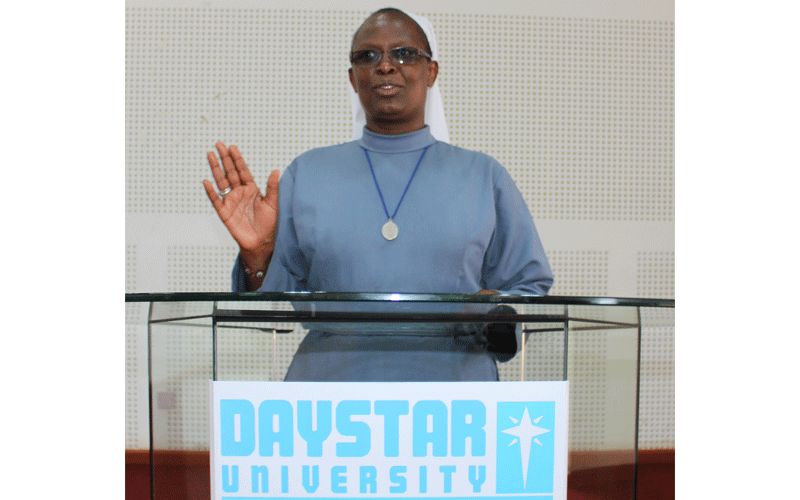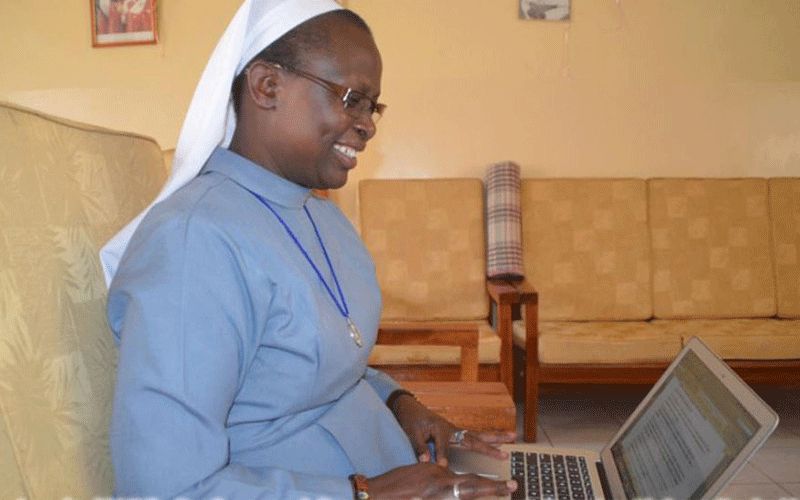In October 2016, she became the first African to be elected to the position of Board of Directors of the International Communication Association (ICA), an academic association of more than 40,000 scholars who are drawn from at least 80 countries.
With over 50 publications, including refereed journal articles, books, book chapters and book introductions, the bubbly professor is the most published among her peers at the university and is only rivalled by the university’s Vice Chancellor, Prof. Laban Ayiro.
Just about a week after she appeared for the interview for her current position, there was enough time for the nun to apply for funding of two research proposals and she had already funds for one when she spoke to ACI Africa on Friday, June 26.

“Thanks to the pressure from the Vice Chancellor that I embrace the office with boldness and passion, I received the appointment running,” Sr. Lando said in her acceptance note that followed her June 15 appointment.
(Story continues below)
“I appeared for the interview on Friday 12th June 2020. And on 19th June 2020, I attempted two research grants with KFC (Kenya Film Commission),” she said in the note that she shared with ACI Africa.
The first research, “To examine the extent of Kenyan artists’ knowledge & practice of rights” has already earned Daystar University KES.500,000.00 (US$5,000.00) in seed funding while the second, “How can the Kenya film commission push the good news agenda?” is scheduled for funding in the new financial year, beginning July 2020.
“This indeed is a great favour from God! I pray that it’s an indication of the great wonders the good Lord is going to perform in the Research Directorate,” she says, expressing her optimism in her new role after serving at Daystar University’s Department of Communication for the last 12 years.

A Professor of Communications and Media Studies, Sr. Lando, an alumna of the Rome-based Pontifical Gregorian University says she is never bound by her specialization while conducting research but explores other fields.
“I am a scholar and being a scholar, I research about anything that I feel needs probing especially in the social sciences,” she says, adding that her past surveys have included Leadership and even Mathematics.
To address the challenge of funding, the Kenyan-born scholar encourages researchers to develop cutting edge research proposals that attract the interest of potential funding organizations.
She also insists on collaborative research and encourages novices in academia to hook themselves with big names in the field who have no problem getting funding.

“Always look for opportunities to work on collaborative projects. Sometimes, you become the principal investigator, sometimes the second and so on. Some big names in academia are always looking for scholars to work with them,” she says, adding that in one of her recent surveys in Rwanda, she was brought on board by a team of researchers at the U.S.-based Maryland University who had all the resources that were required for the research.
The Catholic professor discourages dons from being attracted to quick-return ventures and neglecting research, which is regarded as “highly unrewarding.”
“Research in our universities continues to suffer because it is highly unrewarding. It is very expensive and takes a lot of time. It is heavy work and it is therefore not appealing to our lecturers who go looking for quicker means to make money,” she says.
Sr. Prof. Lando who is overseeing the establishment of Ukweli Television for the Catholic Church in Kenya adds, “It is easier for a lecturer to teach in different universities and expand their sources of income than engage in research.”
Her vision for Daystar University where she is witnessing her Catholic faith is to place research at the center of all the activities of the university following her three-year mandate as the Director of Research and Postgraduate Studies.

“Ordinarily, teaching has always been number one in Kenyan universities, always coming ahead of research and community service,” she says and adds, “It is my prayer and hope that at the end of the three years, we will have managed to have as our core functions in the order of research, teaching and community service. So that research informs our teaching and community service. Research makes a university active. And that is our focus.”
Her passion for research, she says, is grounded in her pursuit for truth and the knowledge that the Bible is grounded on truth.
“Research is a systematic organization to a logical conclusion and pursuit for truth. Pursuit for truth is the foundation of the Bible,” Sr. Prof. Lando says, and explains, “Research is very Biblical. It starts from the Book of Genesis that highlights how God created everything in a systematic way.”
Agnes Aineah is a Kenyan journalist with a background in digital and newspaper reporting. She holds a Master of Arts in Digital Journalism from the Aga Khan University, Graduate School of Media and Communications and a Bachelor's Degree in Linguistics, Media and Communications from Kenya's Moi University. Agnes currently serves as a journalist for ACI Africa.














